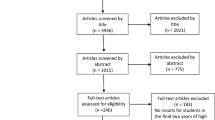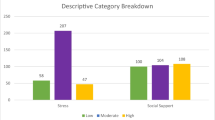Abstract
The present study experimentally examined how counselor perceptions of hypothetical students are affected by student gender and socioeconomic status (SES). Results showed that counselors perceive students from low SES backgrounds as having less promising futures and lower math abilities. Counselors also rated female students as lower in math abilities than male students. Our results indicate that institutions should consider providing more school counselor training to reduce bias based on gender and SES.
Similar content being viewed by others
References
Adams J.R., Benshoff J.M. and Harrington S.Y. (2007). An examination of referrals to the school counselor by race, gender, and family structure. Professional School Counseling 10: 389–398
Carter L., Thompson G.L. and Warren S. (2004). It’s not my fault: Predicting high school teachers who blame parents and students for students’ low achievement. High School Journal 87: 5–15
Childs G. and McKay M. (2001). Boys starting school disadvantaged: Implications from teachers’ ratings of behaviour and achievement in the first two years. British Journal of Educational Psychology 71: 303–314
Cicourel A.V. and Kitsuse J.I. (1963). Educational decision makers. Indianapolis, Bobbs-Merrill
Comstock D.L., Duffey T.H. and St. George H. (2003). Gender issues in counselor preparatory programs: A relational model of student development. Journal of Humanistic Counseling, Education and Development 42: 62–79
Constantine M.G. and Gushue G.V. (2003). School counselors’ ethnic tolerance attitudes and racism attitudes as predictors of their multicultural case conceptualization of an immigrant student. Journal of Counseling & Development 81(2): 185–190
Cox A.A. and Lee C.C. (2007). Challenging educational inequities: School counselors as agents of social justice. In: Lee, C.C. (eds) Counseling for Social Justice, 2nd Ed, pp 3–14. American Counseling Association, Alexandria, VA
Dusek J.B. and Joseph G. (1983). The bases of teacher expectancies: A meta-analysis. Journal of Educational Psychology 75: 327–346
Good T.L. (1981). Teacher expectations and student perceptions: A decade of research. Educational Leadership 38: 415–421
Harris H.L. (2002). School counselors’ perceptions of biracial children: A pilot study. Professional School Counseling 6: 120–130
Holcomb-McCoy C. (2007). School counseling to close the achievement gap: A social justice framework for success. Corwin Press, Thousand Oaks, CA
Jacobson L. and Rosenthal R. (1968). Pygmalion in the classroom: Teacher expectations and pupils’ intellectual development. Holt, Rinehart & Winston, New York
Ladson-Billings G. (1994). What we can learn from multicultural education research. Educational Leadership 51: 22–26
La Londe D., Leedy M.G. and Runk K. (2003). Gender equity in mathematics: Beliefs of students, parents, and teachers. Social Science and Mathematics 103: 285–293
Larkin J.C. and Pines H.A. (1979). No fat persons need apply. Sociology of Work and Occupations 6: 312–327
McKown C. and Weinstein R.S. (2002). Modeling the role of child ethnicity and gender in children’s differential response to teacher expectations. Journal of Applied Social Psychology 32: 159–185
Rollins, C.P. (2003). High school guidance counselor ratings of success for postsecondary options: A study of socioeconomic, racial, and gender bias. Dissertation, University of Kentucky
Thomas M.B., Moore H.B. and Sams C. (1980). Counselor renewal workshop in gender equality. Counselor Education and Supervision 20: 56–61
Tomini B.A. and Page S. (1992). Vocational bias and gender: Evaluations of high school counselors by Canadian university undergraduates. Canadian Journal of Counseling 26: 100–106
Tournaki N. (2003). Effect of student characteristics on teachers’ predictions of student success. Journal of Educational Research 96: 310–320
Ungar M. (2006). Strengths-based counseling for at-risk youth. Corwin Press, Thousand Oaks, CA
Warren S.S. (2002). Stories from the classrooms: How expectations and efficacy of diverse teachers affect the academic performance of children in poor urban schools. Educational Horizons 80: 109–116
Author information
Authors and Affiliations
Corresponding author
Rights and permissions
About this article
Cite this article
Auwarter, A.E., Aruguete, M.S. Counselor perceptions of students who vary in gender and socioeconomic status. Soc Psychol Educ 11, 389–395 (2008). https://doi.org/10.1007/s11218-008-9056-0
Received:
Accepted:
Published:
Issue Date:
DOI: https://doi.org/10.1007/s11218-008-9056-0




